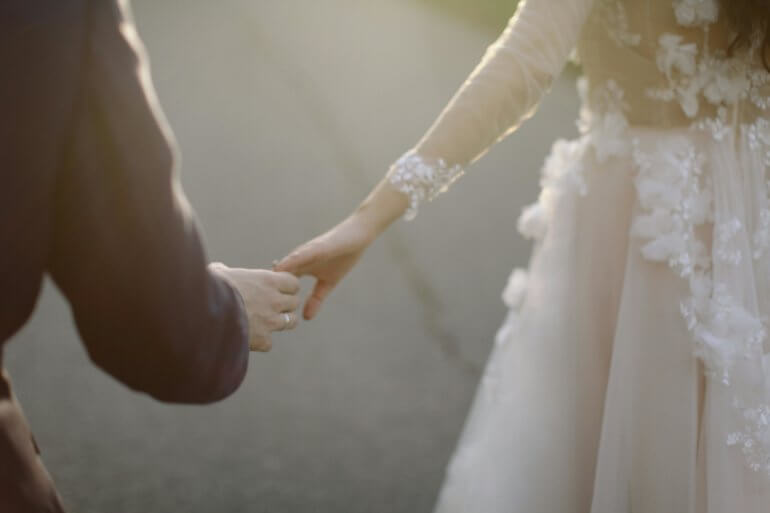
Debunking Myths Surrounding Orthodox Jewish Marriage
“Do you love me?”
Thus sings Tevye to his wife of 25 years in the classic movie “Fiddler on the Roof.” Her response?
“For twenty-five years I’ve washed your clothes, cooked your meals, cleaned your house, given you children, milked your cow…”
This does not sound like romance at its best.
Orthodox Jews tend not to be portrayed in the media as the passionate, romantic type; actually, they usually come off as puritanical, formalistic, even emotionless. One could be forgiven for wondering what kind of marriages Orthodox Jews have in light of such portrayals (all the more so if you remember how Yenta the matchmaker tries to set up Tevye’s daughters!).
Do Orthodox Jews have romance in their lives? Love? Passion? Or are their marriages simply arrangement of socioeconomic convenience?
The History of Jewish Marriage
There’s no question that for most of human history, marriage was more of a socioeconomic matter than an expression of love. Marrying for love is a fairly new invention. This is true among Orthodox Jews as much as for every other culture in the world.
And yet, as far back as our sources go, Judaism teaches about a deeper layer in marriage. The Torah tells us that Isaac did indeed love his wife Rebekah when they got married (even though they did meet through a matchmaker!).
In fact, Maimonides, in one of the most authoritative legal codes, states that “a man should honor his wife more than himself and love her as himself.” A loving, emotional connection is an expectation in a Jewish marriage.
Mystically, the Torah tells us that a man and wife are in fact two halves of a whole; their souls are destined for each other from before they are even born, and seek to reconnect with and complete each other. Every marriage is an expression of this longing and fulfillment.
It is also worth noting as well that centuries before Western society began taking seriously violence within marriage, the Sages spoke out strongly against domestic violence, and they required mutual consent for sexual relations even for married couples.
Finding the Passion
One could easily come to think that Orthodox Judaism is prudish when it comes to sexuality; it’s generally regarded as a private matter, not fit for public consumption. But in the right time and place, sexuality is considered extremely important, even sacred.
Moreover, the sexual relationship is not meant to be purely functional or reproductive. A man is actually legally required as part of his marital obligations to provide sexual satisfaction to his wife and vice versa. And Rashi, a foremost Talmudic commentator, insists that sex can’t just be perfunctory; it must be done with excitement and desire.
A remarkable story in the Talmud demonstrates this: Rav Kahana once decided that he needed to understand how a true Torah scholar is supposed to conduct his sex life. So he figured the best way to do that is to hide under his rabbi’s bed and see how it goes. (Do not try this at home.) I suppose he expected something deeply meditative and reverential, or perhaps a brief and formal engagement.
Instead, he witnessed his rabbi engaging in a light-hearted, playful, even salacious interaction with his wife (before being discovered and thrown out, that is).
Forging a Connection
It should go without saying that to have a passionate physical connection, there needs to be a deep emotional connection as well. Sex is prohibited even between married spouses when one or both of them are angry at each other, or drunk, or planning to divorce.
Jewish books on deepening one’s marriage have been written throughout the ages, from “The Holy Missive” written by Nachmanides in the 13th century until this very day, with dozens if not hundreds of Jewish books available on improving the marital bond.
But to me, one of the most striking attestations to the importance of love and connection in a Jewish marriage comes from the mouths of our Torah leaders. Rabbi Yosef Shalom Elyashiv was a massive Torah scholar of the last generation. If you imagine a Torah scholar in your mind, you probably see a wizened old man with thick glasses and a long white beard.
That’s Rabbi Elyashiv.
He was a rabbi’s rabbi. His ultra-demanding study schedule was legendary – so much so that when his wife passed away, as a (rather lame) attempt at comforting him, one of his students pointed out that he would now have more time to learn Torah.
Rabbi Elyashiv’s forlorn reply was, “What do you mean? I have lost the other half of myself!” Brilliant as he was, Rabbi Elyashiv was no walking cerebrum. He was a man in love, bereft.
Choose Love
At the end of their duet, Tevya and his wife realize that they do indeed love each other. It’s cute. But the reality is, love shouldn’t be an accident in a Jewish marriage. God tells us in the Torah, “See that I have placed before you life and good . . . and I am commanding you to love . . .” Says a prominent commentator on this verse, “you see from here that life is for love.”
Love, passion, connection – these aren’t optional bonuses. They are essential components of marriage that Orthodox Jews have cultivated, savored, and delighted in for millenia.
If you found this content meaningful and want to help further our mission through our Keter, Makom, and Tikun branches, please consider becoming a Change Maker today.







